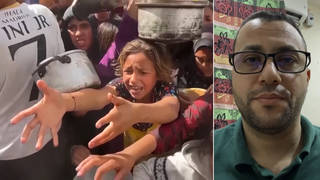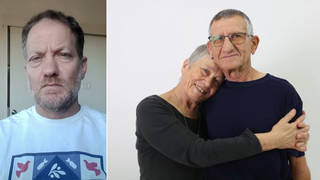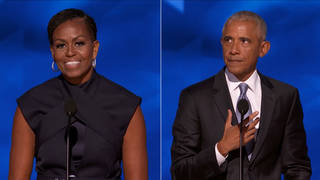
Topics
Guests
- Sen. Barack Obamaspeaking Tuesday in Winston-Salem, North Carolina.
- Rev. Jeremiah Wrightspeaking Monday at the National Press Club in Washington, D.C.
On Tuesday, Senator Barack Obama said he was “outraged” and “saddened” by “divisive and destructive” comments by his former pastor, the Reverend Jeremiah Wright. Since the weekend, Reverend Wright has publicly defended himself after weeks of being lambasted by politicians and pundits for his sermons. We hear from both Obama’s and Wright’s speeches. [includes rush transcript]
Transcript
JUAN GONZALEZ: Senator Barack Obama sharply denounced his former pastor Reverend Jeremiah Wright at a press conference in Winston-Salem, North Carolina, Tuesday. Senator Obama said he was “outraged” and “saddened” by the “divisive and destructive” comments Reverend Wright had made at the National Press Club on Monday. Obama had previously distanced himself from Reverend Wright’s political beliefs but had refused at that time to repudiate his former pastor, whom he likened to a family member.
Over the weekend, Reverend Wright made three public appearances to defend himself after weeks of being attacked by politicians and pundits for his sermons and their alleged anti-Americanism.
Senator Obama’s comments Tuesday came in the wake of the renewed media attention on his ties to Reverend Wright and one week before the primaries in Indiana and North Carolina. We’re going to play an excerpt of Senator Obama’s statement Tuesday.
SEN. BARACK OBAMA: Yesterday we saw a very different vision of America. I am outraged by the comments that were made and saddened over the spectacle that we saw yesterday. I have been a member of Trinity United Church of Christ since 1992. I’ve known Reverend Wright for almost twenty years. The person I saw yesterday was not the person that I met twenty years ago. His comments were not only divisive and destructive, but I believe that they end up giving comfort to those who prey on hate, and I believe that they do not portray accurately the perspective of the black church. They certainly don’t portray accurately my values and beliefs.
When he states and then amplifies such ridiculous propositions as the US government somehow being involved in AIDS, when he suggests that Minister Farrakhan somehow represents one of the greatest voices of the twentieth and twenty-first century, when he equates the United States wartime efforts with terrorism, then there are no excuses. They offend me. They rightly offend all Americans. And they should be denounced. And that’s what I’m doing very clearly and unequivocally here today.
JUAN GONZALEZ: Senator Obama, denouncing Reverend Jeremiah Wright, his former pastor from the Trinity United Church of Christ in Chicago.
I want to turn now to the speech that has come under so much fire. We’re going to play excerpts from Reverend Wright’s responses to some questions Monday at the National Press Club in Washington, D.C. But first, this is Reverend Wright describing what he calls the prophetic theology of the black church and its principals of liberation and transformation.
REV. JEREMIAH WRIGHT: These two foci of liberation and transformation have been at the very core of the black religious experience from the days of David Walker, Harriet Tubman, Richard Allen, Jarena Lee, Bishop Henry McNeal Turner and Sojourner Truth, through the days of Adam Clayton Powell, Ida B. Wells, Dr. Martin Luther King, Rosa Parks, Malcolm X, Barbara Jordan, Cornel West, and Fanny Lou Hamer.
These two foci of liberation and transformation have been at the very core of the United Church of Christ since its predecessor denomination, the Congregational Church of New England, came to the moral defense and paid for the legal defense of the Mende people aboard the slave ship Amistad, since the days when the United Church of Christ fought against slavery, played an active role in the Underground Railroad, and set up over 500 schools for the Africans who were freed from slavery in 1865.
And these two foci remain at the core of the teachings of the United Church of Christ, as it has fought against apartheid in South Africa and racism in the United States of America ever since the union which formed the United Church of Christ in 1957.
These two foci of liberation and transformation have also been at the very core and the congregation of Trinity United Church of Christ since it was founded in 1961. And these foci have been the bedrock of our preaching and practice for the past thirty-six years.
Our congregation, as you heard in the introduction, took a stand against apartheid when the government of our country was supporting the racist regime of the African government in South Africa.
Our congregation stood in solidarity with the peasants in El Salvador and Nicaragua, while our government, through Ollie North and the Iran-Contra scandal, was supporting the Contras, who were killing the peasants and the Miskito Indians in those two countries.
Our congregation sent thirty-five men and women through accredited seminaries to earn their Master of Divinity degrees, with an additional forty currently being enrolled in seminary, while building two senior citizen housing complexes and running two childcare programs for the poor, the unemployed, the low-income parents on the South Side of Chicago for the past thirty years.
Our congregation feeds over 5,000 homeless and needy families every year, while our government cuts food stamps and spends billions fighting in an unjust war in Iraq.
Our congregation has sent dozens of boys and girls to fight in the Vietnam War, the first Gulf War and the present two wars in Afghanistan and Iraq. My goddaughter’s unit just arrived in Iraq this week, while those who call me unpatriotic have used their positions of privilege to avoid military service, while sending — while sending over 4,000 American boys and girls of every race to die over a lie.
Our congregation has had an HIV/AIDS ministry for over two decades. Our congregation has awarded over $1 million to graduating high school seniors going into college and an additional $500,000 to the United Negro College Fund and the six HBCUs related to the United Church of Christ, while advocating for healthcare for the uninsured, workers’ rights for those forbidden to form unions, and fighting the unjust sentencing system which has sent black men and women to prison for longer terms for possession of crack cocaine than white men and women have to serve for the possession of powder cocaine.
Our congregation has had a prison ministry for thirty years, a drug and alcohol recovery ministry for twenty years, a full-service program for senior citizens, and twenty-two different ministries for the youth of our church, from preschool through high school, all proceeding from the starting point of liberation and transformation, a prophetic theology which presumes God’s desire for changed minds, changed laws, changed social orders, changed lives, changed hearts in a changed world.
The prophetic theology of the black church is a theology of liberation. It is a theology of transformation. And it is ultimately a theology of reconciliation.
DONNA LEINWAND: You have said that the media have taken you out of context. Can you explain what you meant in a sermon shortly after 9/11 when you said the United States had brought the terrorist attacks on itself, quote, “America’s chickens are coming home to roost”?
REV. JEREMIAH WRIGHT: Have you heard the whole sermon? Have you heard the whole sermon?
DONNA LEINWAND: I heard most of it.
REV. JEREMIAH WRIGHT: No, no, the whole sermon, yes or no? No, you haven’t heard the whole sermon? That nullifies that question.
Well, let me try to respond in a non-bombastic way. If you heard the whole sermon, first of all, you heard that I was quoting the ambassador from Iraq. That’s number one. But number two, to quote the Bible, “Be not deceived. God is not mocked. For whatsoever you sow, that you also shall reap.” Jesus said, “Do unto others as you would have them do unto you.”
You cannot do terrorism on other people and expect it never to come back on you. Those are biblical principles, not Jeremiah Wright bombastic, divisive principles.
DONNA LEINWAND: Senator Obama has tried to explain away some of your most contentious comments and has distanced himself from you. It’s clear that many people in his campaign consider you a detriment. In that context, why are you speaking out now?
REV. JEREMIAH WRIGHT: On November the 5th and on January 21st, I’ll still be a pastor. As I said, this is not an attack on Jeremiah Wright. It has nothing to do with Senator Obama. It is an attack on the black church launched by people who know nothing about the African American religious tradition.
And why am I speaking out now? In our community, we have something called playing the dozens. If you think I’m going to let you talk about my mama and her religious tradition and my daddy and his religious tradition and my grandma, you’ve got another thing coming.
DONNA LEINWAND: What is your relationship with Louis Farrakhan? Do you agree with and respect his views, including his most racially divisive views?
REV. JEREMIAH WRIGHT: What I think about him, as I said on Bill Moyers and it got edited out, how many other African Americans or European Americans do you know that can get one million people together on the Mall? He is one of the most important voices in the twentieth and twenty-first century. That’s what I think about him. I said, as I said on Bill Moyers, when Louis Farrakhan speaks, it’s like E.F. Hutton speaks, all black America listens. Whether they agree with him or not, they listen.
DONNA LEINWAND: What is your motivation for characterizing Senator Obama’s response to you as, quote, “what a politician had to say”? What do you mean by that?
REV. JEREMIAH WRIGHT: What I mean is what several of my white friends and several of my white Jewish friends have written me and said to me. They said, “You’re a Christian. You understand forgiveness. We both know that if Senator Obama did not say what he said, he would never get elected.”
Politicians say what they say and do what they do based on electability, based on sound bites, based on polls, Huffington, whoever’s doing the polls. Preachers say what they say, because they’re pastors. They have a different person to whom they’re accountable.
As I said, whether he gets elected or not, I’m still going to have to be answerable to God November 5th and January 21st. That’s what I mean. I do what pastors do. He does what politicians do.
JUAN GONZALEZ: Reverend Jeremiah Wright, speaking at the National Press Club in Washington, D.C. on Monday. We have to take a break for a minute. When we return, a debate on Reverend Wright and Senator Obama. Stay with us.












Media Options